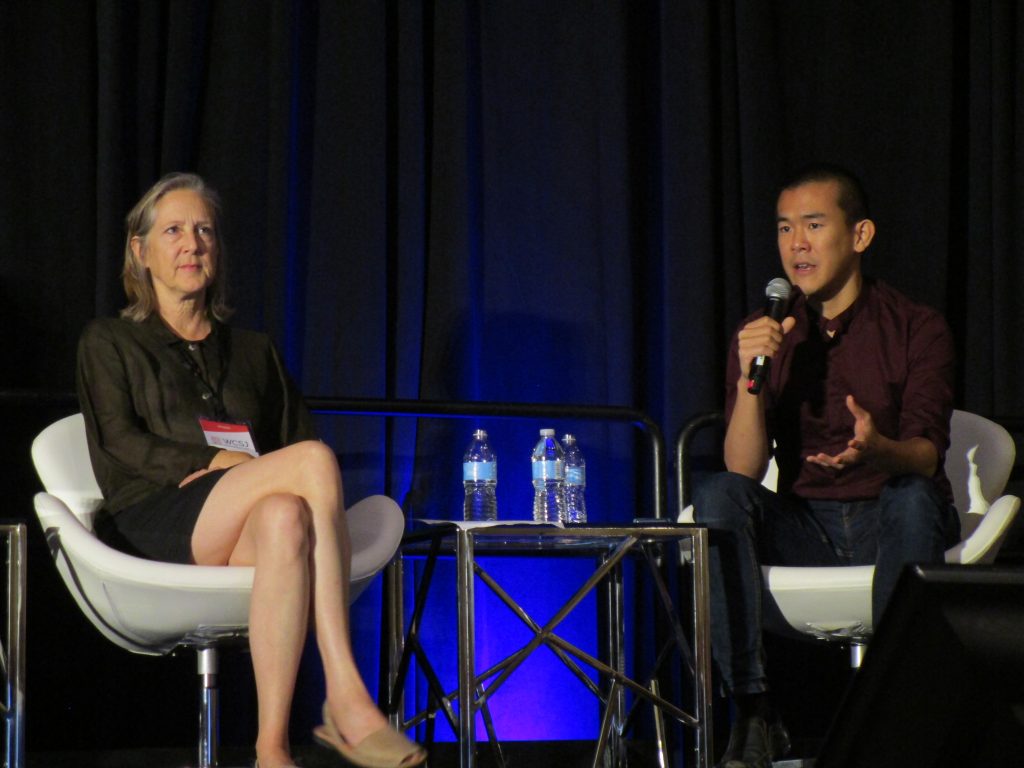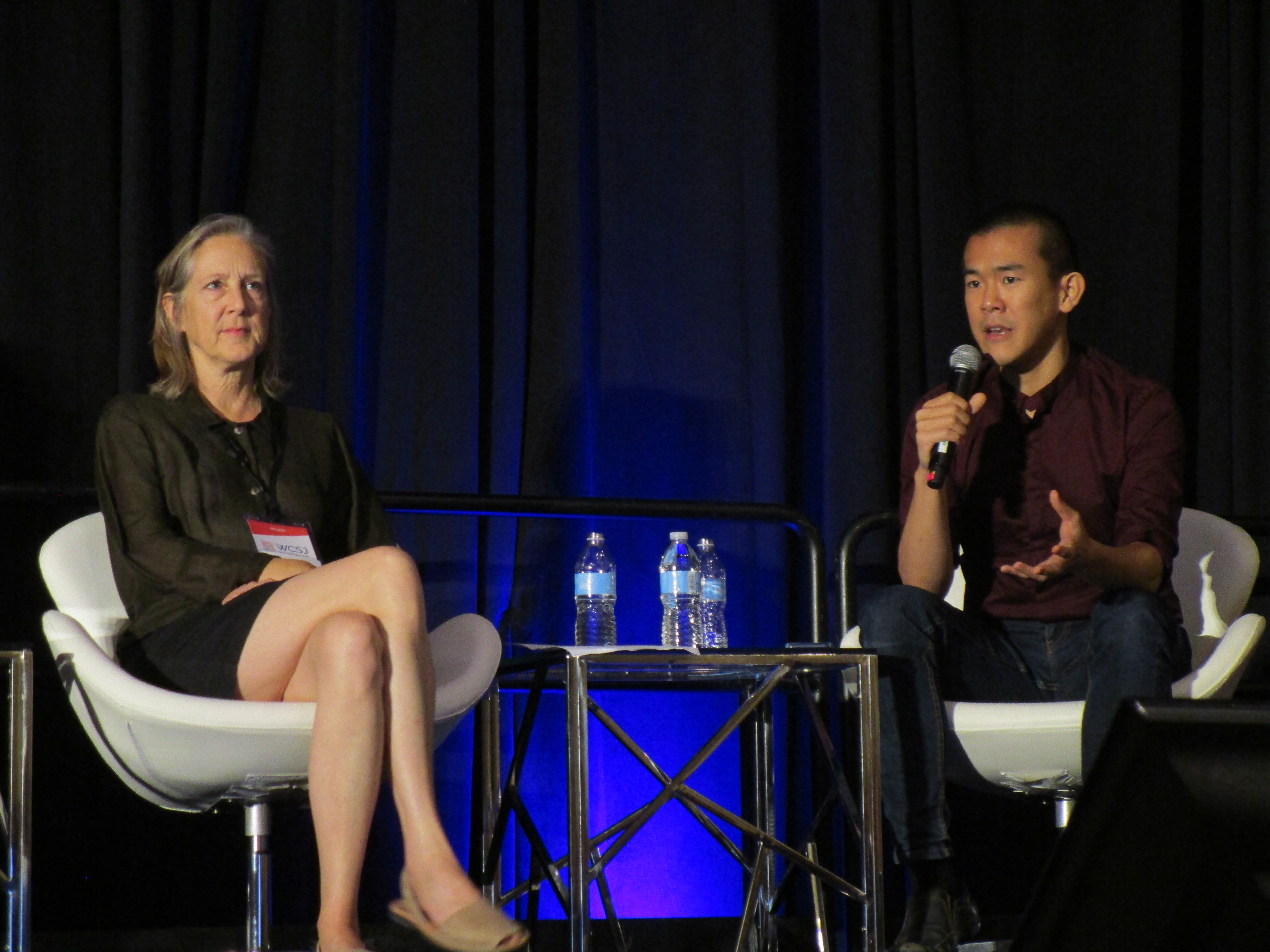Three Book Writers, Three Writing Styles: The Many Roads to a Bestseller

Moderator Mary Roach and author Ed Yong. Photo: Sibusiso Biyela
SAN FRANCISCO—With little overlap in their approaches, the writers agreed on one thing: If you have a subject you are passionate about and would love to spend several years delving into that subject regardless of the outcome, write that book.
On 28 October at the World Conference of Science Journalists 2017, three successful authors shared the nuts and bolts of their book-writing experiences in a session titled “Book It: A Conversation Between Authors Steve Silberman and Ed Yong.” Mary Roach, author of six New York Times bestsellers, moderated the session.
The panelists’ different styles were on display even on the basic issue of deadlines. Yong, author of I Contain Multitudes: The Microbes Within Us and a Grander View of Life, stuck close to deadlines and made sure to not endlessly rewrite. Silberman, author of Neurotribes: The Legacy of Autism and the Future of Neurodiversity, admitted to spending too many years on his book, letting deadlines pass unmet. But when he finished, he felt “like I moved the world a millionth of an inch. That gives me a sense of gratification that a hundred articles in WIRED never would have.”
Whether you are out to dispel societal misunderstandings on autism or take your readers on a grand tour of the underappreciated universe of our microbiome, you need an agent to sell a book. Finding one whom you trust and with whom you share the same wavelength is crucial, the authors agreed.
Writing a book proposal
But they soon broke off into rather different approaches to crafting a book proposal. Over the course of three rounds of iterative exchanges with his agent, Yong developed his proposal by first submitting a one-page essay, then revising and expanding it into a 2,000-word proposal. “It was super-efficient!” he noted.
Silberman’s proposal, in contrast, ran 108 pages. “I will never write a book proposal again that is more than 12 pages,” he confessed. At least, he said, that lengthy proposal functioned as a good outline.
Roach, who has eight books under her belt, shared the benefits of staying with the same editor and publisher: Book proposals get shorter, sometimes down to a conversation over lunch. “As long as the book is better than the pitch, it doesn’t matter,” she added.
Confronting writer's block
Tactics for actually taming the chaos of reporting a book and sitting down to write varied even more drastically. Once Roach amassed enough material for a chapter, she would write—even though she didn’t always know where it might fit in the book. “It is psychologically comfortable for me, although it is not the smartest thing to do,” she said.
Yong, on the other hand, spent six months reporting and structuring his chapters into themes. Index cards helped him visually shuffle his ideas around on a large canvas. Silberman is also a fan of index cards on the wall. In his words, “It is much easier than holding everything in your mind. It involves your body, so you get your muscle memory” of the content, he said.
Book writing requires “a different mindset" than that of a beat reporter.
In science, new papers constantly come out and fields evolve within weeks. How does an author keep the manuscript, which takes months or years to prepare, up to date? Silberman avoided the pressure to be timely by focusing on a deep history of autism research. Yong focused on “deep principles and underlying truths” about the microbiome. Book writing takes “a different mindset than a beat reporter covering breaking news and new developments,” Roach added.
Getting the facts right is a must, but hiring a fact-checker can eat up your budget. Given the antivaccine advocates who scrutinize all things about autism, Silberman made sure to extensively index his bibliography.
As a former blogger (“Not Exactly Rocket Science”), Yong was used to facing what he called “an army of bastards on the Internet trying to point out where I’ve gone wrong.” As such, he became a rigorous self-checker.
All three writers emphasized the more important concern of getting the big picture right: Don’t be afraid to check concepts with expert sources.
No one goes into book writing expecting a bestseller, because most books don’t sell well. However, if your interests and passion come through, people will love it. Those in the publishing world will take note, and things will begin to roll.
—
Setsen Altan-Ochir promotes scientific literacy in Mongolia through translating and screening documentaries (artfilm.mn), training students in critical thinking and writing (writers.mn), writing for the Science and Technology Fund, and working for the NGO People in Need. She studied Earth science and is eager to cover science stories from Asia for international outlets. Contact her at setseneee@gmail.com and follow her on Twitter @setsenee.

